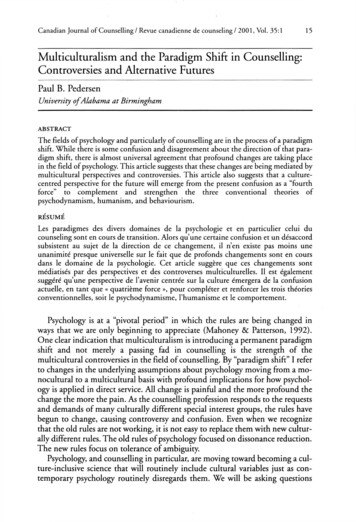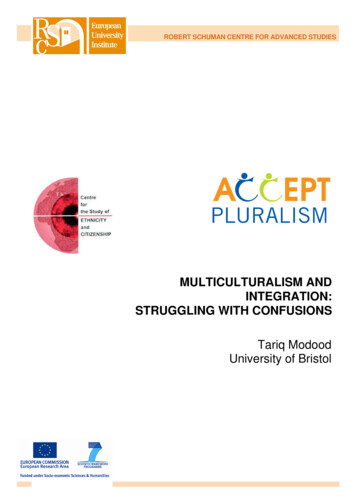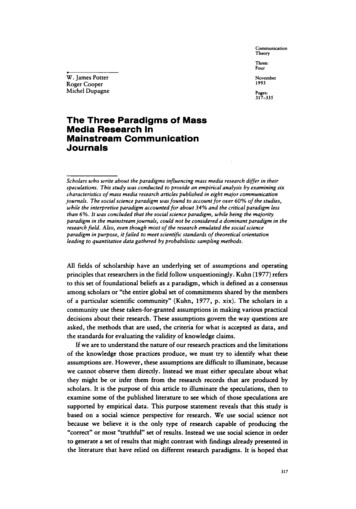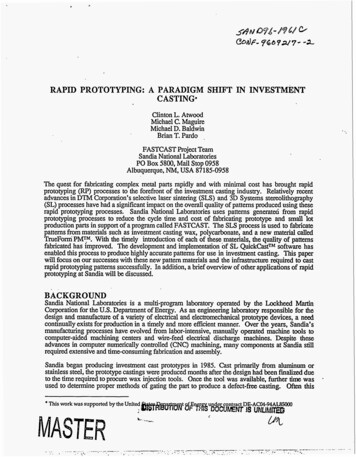
Transcription
Canadian Journal of Counselling / Revue canadienne de counseling I 2001, Vol. 35:115Multiculturalism and the Paradigm Shift in Counselling:Controversies and Alternative FuturesPaul B. PedersenUniversity of Alabama at BirminghamABSTRACTThefieldsof psychology and particularly of counselling are in the process of a paradigmshift. While there is some confusion and disagreement about the direction of that paradigm shift, there is almost universal agreement that profound changes are taking placein the field of psychology. This article suggests that these changes are being mediated bymulticultural perspectives and controversies. This article also suggests that a culturecentred perspective for the future will emerge from the present confusion as a "fourthforce" to complement and strengthen the three conventional theories ofpsychodynamism, humanism, and behaviourism.RESUMELes paradigmes des divers domaines de la psychologie et en particulier celui ducounseling sont en cours de transition. Alors qu'une certaine confusion et un désaccordsubsistent au sujet de la direction de ce changement, il n'en existe pas moins uneunanimité presque universelle sur le fait que de profonds changements sont en coursdans le domaine de la psychologie. Cet article suggère que ces changements sontmédiatisés par des perspectives et des controverses multiculturelles. Il est égalementsuggéré qu'une perspective de l'avenir centrée sur la culture émergera de la confusionactuelle, en tant que « quatrième force », pour compléter et renforcer les trois théoriesconventionnelles, soit le psychodynamisme, l'humanisme et le comportement.Psychology is at a "pivotal period" in which the rules are being changed inways that we are only beginning to appreciate (Mahoney & Pattetson, 1992).One clear indication that multiculturalism is introducing a permanent paradigmshift and not merely a passing fad in counselling is the strength of themulticultural controversies in the field of counselling. By "paradigm shift" I referto changes in the underlying assumptions about psychology moving from a monocultural to a multicultural basis with profound implications for how psychology is applied in direct service. All change is painful and the more profound thechange the more the pain. As the counselling profession responds to the requestsand demands of many culturally different special interest groups, the rules havebegun to change, causing controversy and confusion. Even when we recognizethat the old rules are not working, it is not easy to replace them with new culturally different rules. The old rules of psychology focused on dissonance reduction.The new rules focus on tolerance of ambiguity.Psychology, and counselling in particular, are moving toward becoming a culture-inclusive science that will routinely include cultural variables just as contemporary psychology routinely disregards them. We will be asking questions
Paul B. Pedersen16like: Which psychological theory works best in each cultural context? What arethe cultural boundaries of each psychological theory? Which psychologicalphenomena are more likely to occur in most cultures? (Gielen, 1994). We will nolonger speak of cross-cultural psychology but rather understand all humanbehaviour in the cultural context where that behaviour was learned and isdisplayed (Segall, Dasan, Berry, & Poortinga, 1990).Smith, Harre, and Van Langenhove (1995) contrast the new with the oldparadigms. The new paradigms emphasize the following qualities: (a) understanding and description more than just measuring, (b) predicting consequencesmore than causation, (c) social significance more than statistical significance, (d)language and discourse more than numerical reductionism, (e) holistic perspectives more than atomistic trivia, (f) complex interacting particulars more thansimplistic universals, and (g) subjectively derived meaning more than objectivelyimposed meaning.The implications of these changes for counselling are very important. Thefollowing article will review the controversies of a culture-centred perspective incounselling. These controversies include the problems of cultural encapsulation,the definition of culture as a construct, the likely impact of multiculturalism onthe psychodynamic, behavioural and humanistic perspectives of psychology, thepotentially positive contribution of a culture-centred perspective, the emergenceof culture-centred competencies for counsellors and other related issues. The future direction of counselling is still unclear but the importance of culture-centredperspectives seems very relevant to adapting to that future direction.CULTURE-CENTREDCONTROVERSIESIncreased recognition of culturally different perspectives has led to a controversial re-examination of counselling. Sue, Ivey, and Pedersen (1996) haveattempted to develop a multicultural theory for counselling to more effectivelymanage these controversies through six basic propositions. First, each Western ornon-Western theory already represents a different worldview, implicitly or explicitly. Second, the comprehensive context of each client-counsellor relationship must be the focus of treatment. Third, the counsellor and client's owncultural identity will influence how problems are defined and direct the goals ofthe counselling process. Fourth, the goal of culture-centred counselling is to expand the repertoire of helping responses available to counsellors. Fifth, there aremany alternative helping roles for counselling from other cultural context tosupplement conventional counselling. Sixth, the individual, family, group, andorganization can only be accurately understood in their cultural context. Thesepropositions raise several specific controversies in counselling.Is Counselling Culturally Encapsulated?Wrenn (1962) first introduced the concept of cultural encapsulation wherereality is defined according to one set of assumptions, culturally encapsulatedcounsellors disregard cultural variations and impose their owns self-reference
Multiculturalism and the Paradigm17criteria, implicit assumptions disregarding reasonable proof and/or rational consistency, simplistic technique-oriented solutions are applied to complex problems, and the dominant culture values as universals. George Albee (1994)describes how the early leaders of psychology displayed such encapsulation.Most of the early leaders in psychology embraced ideological views thatstressed the natural superiority of a white male patriarchy, the acceptance of Social Darwinism, the inferiority of women and of the brunette races. Calvinismstressed economic success as the hallmark of salvation and psychology concurred.Anti-semitism and homophobia were standard. Eugenics spokesmen urged theelimination of the unfit and inferior and opposed welfare programs, decentwages and safe working conditions (p. 22).The Basic Behavioral Science Task Force of the National Advisory MentalHealth Council (1996) in their national plan for behavioural science researchidentified areas where cultural encapsulation continues to be evident in mentalhealth services. First, anthropological and cross- cultural research has demonstrated that cultural beliefs influence diagnosis and treatment. Second, diagnosisof mental illness differs across cultures. Third, individuals express symptoms differently in each cultural context. Fourth, culturally biased variations in diagnosisfollow the diagnostic categories relevant to the majority population. Fifth, mostproviders come from majority cultures while most clients come from minoritycultures.Normal behaviour is typically described according to the norms of an individualistic perspective where dependency is pathologized and support systemsdisregarded. The individual adjusts to fit the system, whether that system is rightor wrong (Pedersen, 1997a), raising the possibility of protecting an unjust systemagainst a justified client in a consistent cultural bias. These cultural biases furtherimpact the research by which counsellors are educated (Lonner & Ibrahim,1996; Paniagua, 1994; Ponterotto, 1988). These culturally encapsulatedassumptions are even reflected in the ethical standards which guide thecounselling profession (LaFromboise & Foster, 1996; Pedersen, 1995). Evenwhen the encapsulation is unintentional (Ridley, 1995) as in color-blindness,thinking of the client's culture as a deficit or disadvantage, positive and/ornegative cultural transference or countertransference or pseudotransference, theappropriateness of counselling services are directly affected.Should Culture be Broadly or Narrowly Defined?Inclusive and broadly defined definitions of culture, including ethnographic,demographic, status and affiliation, have been controversial. There is a concernthat the broad definition would diffuse the focus on narrowly defined interests ofnationality and ethnicity. There has also been some confusion between the broadversus narrow distinctions and universal versus particular perspectives. Thebroad definition of culture takes an orthogonal approach (Oetting & Beauvais,1991) whereby identification with one culture does not decrease identificationwith other cultures and where the simultaneous multiplicity of co-existing identities in each of us is acknowledged (Thompson, Ellis, & Wildavsky, 1990).
¡8Paul B. PedersenAlternative theories such as the dominant majority model, the transitionalmodel, alienation model, multidimensional model and bicultural model allpresume cultural exclusion rather than inclusion (Sue et al., 1996). We canactually belong to many different cultures at the same time. Sometimes withingroup cultural differences actually seem to exceed between-group differences aswe identify the complex and dynamic salience of culture moving from one situation to another (Cross 1995). From this broadly defined perspective, all counselling and, in fact, all communications are inherently and unavoidablymulticultural.From this perspective both the universal and the particular perspective arevalid at the same time. No matter how similar we are, there will be differences.No matter how different we are, there will be similarities. By defining cultureorthogonally, cultures can co-exist without isolation or competition and minorities are neither eliminated nor absorbed. There is no need for a cultural meltingpot. Conflicts are regarded as potentially constructive to a realistic pluralism andconflicts are managed through common-ground shared values. Thus, there is lessneed for militancy toward other cultures because multicultural interaction is lessdestructive and economic resources are re-directed toward constructive activities.While there have been various controversies raised resulting from making culture central rather than trivial to counselling, most of them are derived fromthese two primary areas of controversy. The paradigm shift in psychology resulting from these controversies has positioned multiculturalism as a "fourth force"or dimension of psychology and counselling in a historically unique perspective(Pedersen, 1997a, 1997b).Multiculturalism as a "Fourth Force: "A culture-centred perspective gives added meaning to the three prevailing psychological theories of psychodynamism, behaviourism, and humanism much asthe fourth dimension of time gives meaning to three-dimensional space. That is,a culture-centred perspective is central to the psychodynamic definitions of theunconscious, the reinforcing contingencies of behaviourism, and the personal/meaningful comprehension of humanism. These conventional theories arestrengthened, not weakened, by making culture central to their expression.Transpersonal psychology (Tart, 1975) was the first to claim a fourth forcestatus based on the spiritual revolution in modern society. Many of the principlesof transpersonal psychology have been subsumed into the larger and more diffusemulticultural movement. Others (Mahoney & Patterson, 1992) have describedthe fourth force as a cognitive revolution with an interdisciplinary perspective inwhich human behaviour is described as reciprocal and interactive rather thanlinear and unidirectional. Wrightsman (1992) describes the fourth alternative asbeginning with George Kelly's personal construct theory based on collectivisticand non-Western indigenous psychologies. The new perspective of psychologyadvocates tolerance of ambiguity rather than dissonance reduction, multidimensional reality rather than unidimensionalism, the validity of subjective as well asobjective evidence of proof and the recognition of cultural bias by the dominant
Multiculturalism and the Paradigm19culture in the applications of psychology (Smith, Harre, & Van Langenhove,1995).The social sciences have favored less complicated perspectives because of theproblems presented by ambiguity as an empirical phenomenon, which is difficult to measure in objective terms. "The toleration of ambiguity can be productive if it is taken not as a warrant for sloppy thinking but as an invitation to dealresponsibly with ideas of great complexity" (Levine, 1985, p.17). The newlypopular methods of Chaos Theory and Complexity Theory in the hard and morerecently in the soft science have been more adequate as alternatives to the "linear,reductionistic thinking that has dominated science since the time of Newton—and that has now gone about as far as it can go in addressing the problems of ourmodern world " (Waldrop, 1992, p. 13).Butz (1997) borrows from Chaos Theory to explain how the self organizescomplex experiences into coherent thought. Self is viewed as the coherence orintegrity of each individual's complex experiences. Culture provides us with transitory models of our self-identity, part of which is always changing and part ofwhich remains steady. The self is dynamic like other self-organizing, nonlinearand steady states where stability becomes a stage of the system's developmentalprocess. Culture becomes the perfect metaphor for understanding this new concept of self and modern applications of counselling.There are ar least a dozen positive advantages (Pedersen, 1997a) of makingculture central to this "fourth force" paradigm shift in psychology, as follows:1. Recognizing that all behaviour is learned and displayed in a cultural contextmakes possible accurate assessment, meaningful understanding and appropriate interventions relative to that cultural context. Interpreting behaviourout of context is likely to result in misattribution.2. People who express similar positive expectations or values through differentculturally learned behaviours share the "common ground" that allows themto disagree in their behaviours while sharing the same ultimate positive goal.Not everyone who smiles at you is your friend and not everyone who shoutsat you is your enemy.3. Recognizing the thousands of "culture teachers," each of us has internalizedfrom rhe friends, enemies, relatives, heroes, heroines and fantasies helps usunderstand and identify the sources of our individual identity. As weencounter problems we are likely to imagine how one or another influentialfigure we knew might act in a similar situation.4. Just as a healthy eco-system requires a diversity in the gene pool so a healthysociety requires a diversity of cultural perspectives for its psychologicalhealth. By considering many different perspectives in problem solving we areless likely to overlook the right answer.5. Recognizing our natural tendency to encapsulate ourselves, cultural diversityprotects us from imposing our self-reference criteria inappropriately bychallenging our assumptions. We have been taught to "do unto others as
20Paul B. Pedersenyou would have them do unto you," imposing our own wants and needs onothers.6. Contact with different cultures provides opportunities to rehearse adaptivefunctioning skills that will help us survive in the diversified global village ofthe future. By learning to work with those different from ourselves wealready know we can develop the facility for working with future culturesthat we do not yet know.7. Social justice and moral development require the contrasting culturalperspectives of multiculturalism to prevent any one dominant group fromholding the standards of justice hostage. Every social system that has imposed the exclusive will of the dominant culture as the measure of just andmoral behaviour, has ended up being condemned by history.8. By looking at both similarities and differences at the same time according tothe "quantum metaphor," it becomes possible to identify nonlinearalternatives to rigidly absolutist thinking. It is not just the content of ourthinking but the very process of thinking itself which can become culturallyencapsulated.9. We are able to continue our learning curve to match the rapid social changesaround us by understanding all education as examples of culture shock. Weknow we have learned something new when we experience a sense ofsurprise, making education metaphorically similar to a journey.10. Spiritual completeness requires that we complement our own understandingof Ultimate Reality with the different understandings others have to increaseour spiritual completeness. The well known metaphor that all trails lead tothe top of the mountain may indeed apply to our sense of spiritual understanding.11. The untried political alternative of cultural pluralism provides the onlyalternative to absolutism on the one hand and anarchy on the other. Oursurvival in the future will depend on our ability to work with persons whoare different from ourselves without sacrificing integrity while at the sametime finding common ground.12. A culture-centred perspective will strengthen the relevance and applicabilityof psychology by more adequately reflecting the complex and dynamicreality in which we all live. The multicultural perspective resembles thefourth dimension of time as it complements our understanding of threedimensional space.Because a culture-centred perspective is complicated, it makes research, teaching, and direct service more inconvenient, which has caused cultural differences tobe overlooked or viewed negatively. However, the previous twelve examples demonstrate that there are also important positive consequences of a culture-centredperspective. Culture is perhaps the most important and most misunderstood construct that has emerged from the social sciences in this century. It is important
Multiculturalism and the Paradigm21that we mobilize the positive potential of the cultural metaphor for strengtheningpsychological services in our increasingly multicultural environment.The Cultural Context of Counselling CompetenceThe foundation of competence is cultural self-awareness of his or her biases,stereotypes and beliefs by each counselling professional. Increased awareness requires challenging our assumptions about ourselves and about other groups andworldviews to discover those basic undetlying assumptions which we each assume to be so obviously true that no proof or evidence is required. The tendencyotherwise is to assume that others see the world the same way as ourselves. Wehave been taught to "do unto others as you would have them do unto you"whether they want it done unto them or not!Culture is the context in which all behaviours are learned and displayed.Imagine yourself surrounded by thousands of people whom you have met,learned from, and come to appreciate in your lifetime. Each of these "cultureteachers" has taught you something that you have incorporated into your identity. You do not have just one cultural identity; rather, there are thousands ofdifferent potentially salient identities in each of us. Imagine the thousands ofculture teachers sitting in your seat with you, talking with you and talkingamong themselves about you as you interact actively or listen passively. Thesevoices comprise the "hidden messages" in culture-centred counselling (Pedersen,2000b).These voices are not an episode of schizophrenia but the healthy andnormal behaviour of most thinking people. These are the voices on which wedepend for advice in our thinking and decision making. The search forcompetence is the search for salience in our multidimensional, complicated,ever-changing cultural context (Spengler, Strohmer, Dixon, & Shivy, 1995).Sue et al. (1998) have defined multicultural competence in the developmentalprogression from "cultural awareness" of basic underlying assumptions to "cultural knowledge" about the relevant facts and information toward "cultural skill"or the ability to intervene appropriately. This three-stage developmental sequence was developed as an alternative to the overlapping affective, cognitive,and behavioural categories, and became the basis of evaluation in the 1978-1981N I M H project "Developing interculturalfy skilled counsellors" at the Universityof Hawaii (Pedersen, 1981). The N I M H team examined programs that hadfailed. Some programs failed because they overemphasized awareness, and participants were "repelled" by the overemphasis on awareness because they did notknow what to do with it. Other programs failed because they overemphasizedknowledge, and participants, who lacked awareness, did nor understand whythese facts and information were important or what to do with them. Still otherprograms jumped directly to skills , and participants were able to make changesbut were uncertain about whether rhey were making things better or worsebecause they lacked awareness and knowledge. The model was first published bySue, Arredondo, & McDavis (1992) and later elaborated by Arredondo et al.(1996). Competencies are organized into a three-stage developmental sequencefrom awareness to knowledge and skill. Pedersen (2000a) provides a personal-
21Paul B. Pedersencultural orientation needs assessment in the awareness, knowledge, and skillcompetencies.Awareness is the ability to accurately judge a cultural situation from both one'sown and the other person's cultural viewpoint. Some of the awareness competencies include the ability to recognize direct and indirect communication styles;sensitivity to nonverbal cues; awareness of cultural and linguistic differences; interest in culture; sensitivity to the myths and stereotypes of each culture; concernfor the welfare of persons from another culture; ability to articulate elements ofhis or her own culture; appreciation of the importance of multicultural teaching;awareness of the relationships between cultural groups; and accurate criteria forobjectively judging goodness and badness in the other culture (Pedersen, 1994).Once the foundational competencies of cultural awareness are in place thenext step is gathering meaningful facts to increase knowledge and comprehension of one's own and other cultures. The same facts may have different meaningand different facts may have the same meaning to reflect different cultural contexts. What are the salient social customs in a culture which define protocol andappropriateness of interacting both for insiders and outsiders?What is the family like and how do family members relate to one another in avariety of different situations? What is the housing, clothing and food like? Isthere a class and/or status structure? What political patterns are used? What istheir religion and folk beliefs? How are economic institutions used? How do theyexpress their art? What are their value systems? (Pedersen, 1997b). Knowing thehistory, life experiences, values, hopes, fears and aspirations of a culture are crucial to competent interventions. These questions are important to a culturecentred perspective because they contribute to an accurate and meaningfulcomprehension of the cultural context.If awareness helps the counsellor ask the right questions then knowledge is thesearch for right answers to those questions. Increased knowledge or comprehension clarifies the appropriate alternatives available to the counsellor. These factsmay describe historical events, personality styles, the role of education, the measures of status, the preferred style of learning and where all this and other contextually relevant information can be found. While the counsellor obviously cannotknow about each and every culture around them, it is important to recognizelack of knowledge as a deficit in each counsellor's competence. Furthermore, it isimportant to fill in the knowledge gaps with culturally different clients as quicklyand efficiently as possible before attempting to make an intervention.The third developmental level of skill building is based on accurate awarenessand meaningful knowledge as prerequisites to prevention and remediation. Skillis often described as synonymous with competence and therefore becomes themost important stage of all. Skill requires the competence to do the right thing atthe right time in the right way. Skills are difficult to evaluate because sometimesan intervention that would be exactly right in one group would be exactly wrongin another group. Skill requires the ability to present a solution in the otherculture's language and cultural framework. Skill requires us to test our stereotypesagainst a client's real and personal presence, and to modify them appropriately.
Multiculturalism and the Paradigm23If we begin with the assumption that all tests and theories reflect the values ofthe cultural context in which those tests and theories were developed, we realizethat all tests and/or theories are to some extent biased. The skilled counsellorneeds to be able to make appropriate applications of these culturally biased testsand theories so that the culturally different client will be helped. These skillsinvolve learning appropriate teaching/learning styles for each intervention; examining one's own teaching/learning style for examples of cultural bias; knowinghow to establish empathie rapport with persons from the other culture; receivingand accurately analyzing feedback from persons of the other culture; and developing new methods for working in the other culture appropriately.The awareness objectives of culture-cenrred counselling competence focus onchanging the attitudes, opinions, and personal perspectives about one's self andother cultures so that these elements are in harmony with one another. Theknowledge component of competence focuses on increasing the amount of accurate facts and information available. Having developed accurate awarenessassumptions we are now able to test those assumptions against the facts. Ourlevel of awareness is certain to increase in direct proportion to the extent of ourknowledge about other cultures. Skill competencies focus on action. If one'sawareness or knowledge is inadequate it will be necessary to recycle and fix theproblem so that right and appropriate action can be taken.CONCLUSIONThe monocultural perspective of psychology has historically served the purposes of a dominant culture in specific ways (Gielen, 1994). Counselling in particular has often been guilty of protecting the status quo system against changeeven when we know the system is ageist, sexist, racist or otherwise biased. We stillassist our clients to "adjust" to that unjust system. With the increase in politicalactivism, affirmative action, and articulate special interest groups, the culturalbiases of conventional psychology have been illuminated. This will ultimatelyincrease the accurate, meaningful, and appropriate competence of psychologists,but this will occur only aftet the painful process of re-examining our underlyingpsychological assumptions.Unless psychology in general and counselling in particular can overcome itsown ethnocentric bias, its usefulness for dealing with culturally defined socialissues will be minimal. During the last 20 years, multiculturalism has graduallybecome a fourth force in psychology. Multiculturalism has been gaining the status of a general theory of psychology (Jackson, 1995) rather than merely amethod for comparing one cultural group with another. At present, Americanpsychology routinely neglects perspectives and findings developed in other countries, even when those contributions are published in English. One hopes thatthe multicultural emphasis will help psychology become less ethnocentric in thefuture. There are several trends that give one optimism for the following fivereasons. First, Rosensweig (1992) has pointed out that psychology and psychological publications are growing much more rapidly outside the U.S. than within
24Paul B. Pedersenthe U.S. Second, allfieldsare becoming more global in their focus as a result oftechnology. Third, there is a multicultural movement in the social sciences whichhas increased attention to cultural issues. Fourth, the topic of cultural andmulticultural issues has become more widely accepted in psychological meetingsand publications. Fifth, there is a re-examination of cultural bias in psychologicalservices.Pedersen (1999) has pointed out that there is a considerable resistance to making culture central rather than marginal to counselling. Others have opposedmulticulturalism in the fear that it would heighten ethnic conflict, divisions andtensions, although there is no supporting evidence for those fears. However,wherever there has been a history of violent ethnic hostility and conflict, reconciliation will be problematic. Multicultural training needs to be reframed as aprimary prevention strategy rather than a secondary or tertiary add-on feature.No matter how smart, skilled or powerful you are, if you are making culturallyinappropriate assumptions you will fail. The paradigm shift in counselling ischanging the rules by which competent counsellors do counselling. If the oldrules valued dissonance reduction the new rules value tolerance of ambiguity. Ascounselling becomes more readily available to different cultures on a global scaleit will be important to learn how to meet the needs of others quite different fromourselves. A culture-centred perspective allows t
shift and not merely a passing fad in counselling is the strength of the multicultural controversies in the field of counselling. By "paradigm shift" I refer to changes in the underlying assumptions about psychology moving from a mo nocultural to a multicultural basis with profound implications for how psychol ogy is applied in direct service.










